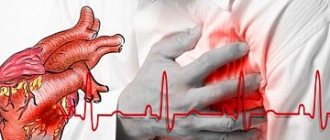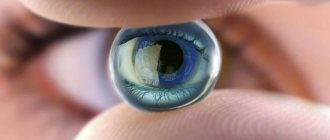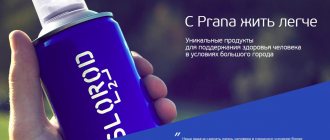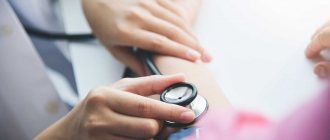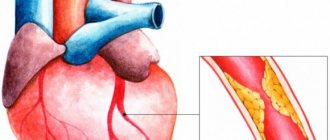If you are already familiar with the risk factors for developing cardiovascular diseases, then, of course, you know that a sedentary lifestyle and lack of sufficient physical activity leads to the accumulation of excess weight and disruption of the normal function of all organs and systems. With physical inactivity, fat and cholesterol are not completely broken down. You also know that sufficient physical activity helps fight atherosclerosis and high blood pressure. Particular attention should be paid to physical activity after a heart attack, during rehabilitation.
Policy on the processing and protection of personal data
This site is maintained by AstraZeneca. We maintain the confidentiality of our site users' information and the security of their personal data.
The Policy describes the principles we apply when we use personal information provided by our users or collected about them online. You express your consent by using this site or registering as a user of interactive services (as applicable) provided by us. Please read our Policy on the processing and protection of personal data carefully. Any disagreements arising regarding the processing of personal data will be considered in accordance with this policy, the notice of data processing provided to you and the norms of the legislation of the Russian Federation.
We may periodically make changes to the Policy on the processing and protection of personal data and, in this regard, we ask you to regularly check the contents of this Policy to ensure that you are using the most current version applicable to this site. We will notify you of any changes upon receipt of your request.
DESCRIPTION OF THE INFORMATION WE COLLECT AND HOW WE USE IT
1. General information
Like many commercial organizations, we monitor use of this site by collecting aggregate information through cookies (see below). As a rule, we keep statistics on the number of visits to the site, each web page and register the name of the original domain of the Internet service provider whose services the visitor uses. The information obtained allows us to make conclusions about the use of the site by the visitor, and may also be transferred to other companies of the Group and other third parties.
2. Personal information
When you register as a user on our website or fill out an online form (for example, to receive email updates), we collect personal information about you, such as your first and last name, email address, country of residence, and other information you provide voluntarily.
We are committed to improving the content and functionality of our site. Therefore, through cookies (and other similar technologies) we collect information about your use of this site (see below). We may also monitor navigation and use of the site in order to improve its design and structure, taking into account user preferences by tailoring content. By doing this, we strive to make the site more user-friendly. We may also conduct statistical analyzes of our user accounts to determine the proportion of active users, the frequency of their visits, and the number of other sites they are registered with.
In some cases, we may receive information about your opinions, for example when you send us feedback or ask questions, as well as information about you from other publicly available sources, which we will supplement with information we already have in order to improve the service to suit your specific requirements. user.
If you provide information about another person, such as your colleague, you confirm that you are acting on the instructions of such person and provide his consent to the processing of his personal information, including important personal information, and also confirm that you have provided such person with information about us and about the purposes (in accordance with this Privacy Policy) for which personal information will be used.
We may provide personal information upon request to comply with legal requirements.
You consent to our transfer of information to countries or jurisdictions that do not provide legal protection for data protection to the same extent as your country. When we make such a transfer, we are committed to ensuring that your information is adequately protected.
All personal data provided to AstraZeneca Pharmaceuticals LLC, as well as companies included in the group (including those entered on the website), can be used and processed, in addition to the above, also for the purposes of:
• providing scientific medical and any other information about AstraZeneca products, as well as materials in written, printed, electronic, audio, video, oral and any other appropriate form, via email, regular and courier mail, telephone calls, SMS messages , messages on social networks on the Internet, in person and/or in any other appropriate way;
• invitations to scientific, educational and other events aimed at improving the professional level of relevant specialists, in all the above ways and in all the above forms;
• creating a database of persons who provided their personal data.
The person who voluntarily provided his personal data and information is notified and consents to the processing by AstraZeneca Pharmaceuticals Limited Liability Company, all other companies included in the group, as well as any third parties to whom AstraZeneca Pharmaceuticals LLC transfers the relevant personal data for the purposes specified above, and subject to the obligatory condition that these persons ensure the security of the personal data provided above, including collection, recording, systematization, accumulation, storage, clarification (updating, changing), extraction, use, transfer (distribution, provision, access, including cross-border transfer), depersonalization, blocking, deletion, destruction with or without the use of automation tools. Also, the Person who voluntarily provided his personal data and information is notified and agrees that during the cross-border transfer of his personal data, recipients of such data may be located in foreign countries that do not provide adequate protection of the rights of personal data subjects. Operators, at the same time, undertake to take all reasonable and appropriate actions to ensure the confidentiality and security of any Personal Data transferred to the territory of any foreign countries.
This consent to the processing of personal data is given for an indefinite period and can be withdrawn by sending a written application to the site administration. I hereby acknowledge and confirm that I have read and agree with the rights and obligations in accordance with the Federal Law of the Russian Federation of July 27, 2006 No. 152-FZ “On Personal Data,” including the procedure for revoking consent to the processing of personal data.
Filling out the form for providing Personal Information implies agreement that any personal data provided by filling out this form can be used, taking into account the consent provided, in accordance with the requirements of the Federal Law of the Russian Federation of July 27, 2006. No. 152-FZ “On Personal Data” and stored for ten years at (125284, Moscow, Begovaya St., 3, building 1) for registration and response to this request for scientific medical information.
Features of exercise therapy
Today, therapeutic physical culture is recognized as a method of rehabilitation therapy for people who have suffered a myocardial infarction.
Previously, it was believed that strict bed rest and complete rest accelerated scarring of the affected area of the heart. However, studies have shown that prolonged inactivity has a negative impact on health: general weakness, depression appear, and the risk of heart failure increases.
Physical therapy exercises after myocardial infarction:
- dilate coronary vessels;
- open additional capillaries and arterioles;
- improve blood supply to all parts of the heart;
- activate metabolic processes in the heart muscle and throughout the body;
- enhance the contractile function of the myocardium;
- improve the functioning of the blood coagulation and anticoagulation system, thereby reducing the risk of blockage of blood vessels with blood clots.
The beneficial effects of physical exercise on the central nervous system are of great importance. Regular training relieves psychological depression in patients, normalizes sleep, and evokes positive emotions.
USING COOKIES
Our website uses cookies. Below you can find out more about how we work with them and how they can be controlled.
When you visit this website, you consent to the use of cookies in accordance with this cookie notice. If you do not agree to these terms, please disable cookies by following the instructions in this cookie notice to prevent cookies from being stored on your device by this website.
What are cookies?
Cookies are small text files that are sent to your device when you visit a website. The cookies are then returned to the original website on each subsequent visit, or to another website that recognizes the cookies. Cookies act as memory for a website, allowing the website to recognize your device when you visit it. Cookies can also remember your preferences, improve your user experience, and tailor the advertising you see to suit your needs.
You can find more information about downloaded cookies, including how to set cookies on your device, as well as how to manage and delete them, at: www.aboutcookies.org
Types of cookies:
Sessional and permanent
We may use session cookies: these only last until you close your browser. But we also use persistent cookies, which are stored for a longer, specified period of time.
Third Party Cookies
Our website may allow providers to load third party cookies on the services we offer. These files are not under our control. For more information about how a third party provider uses cookies, please visit the website of the relevant third party provider. Detailed information about the third-party cookies running on this website, including their purpose, is provided in the table below.
Cookies used on this website
Below is a brief description of the cookies that work on this website. You should check other AstraZeneca websites as their use of cookies may vary.
Necessary cookies
These files are essential to the basic operation of the website, supporting important functionality such as shopping carts, and the technical operation of the website to ensure its proper functioning.
Website visit cookies
These files allow the website to remember your choices (for example, language or region) and provide other, more comprehensive user adaptation capabilities. Typically, these types of cookies do not collect personal data.
Cookies by service level
These cookies are used to operate the website and include customer surveys, recording visitor numbers and other web analytics. They may also collect limited personal data.
Marketing, anonymous, tracking, cross-site cookies
These cookies are used to track our visitors through our websites. They collect information about how visitors use a website, such as which pages they look at most often and whether they receive web page error messages. These cookies may be used to track individual visitors through our websites: for example, by storing a unique visitor ID so that the visitor can be identified by the websites.
Cookies for marketing, targeted advertising
These files are used to track browsing habits and activities. We use this information to be able to show you targeted/personalized marketing materials. With these types of cookies, we may collect personal data and use it to show targeted content.
How to control and delete cookies
Most web browsers accept cookies, but you can change your browser settings to refuse new cookies, disable existing ones, or simply notify you when new cookies are sent to your device.
To set up your browser and refuse cookies, please read its instructions (usually located in the “Help”, “Tools” or “Edit” menu). More detailed guidance can be found at www.aboutcookies.org
Please note that if you refuse or disable cookies, some functionality of the website may be lost. Additionally, disabling cookies or a category of cookies does not remove cookies from your browser. You will need to do this yourself.
Changes to how our cookies work
Notice of any changes to the operation of cookies for this website will be posted here and, if necessary, identified on our web pages highlighting any changes.
Contact Information
If you have any questions regarding cookies, please contact us at
What are the benefits of physical activity?
- With regular physical activity, you are always in good physical shape.
- Physical activity helps increase “good” lipids in the blood, and therefore helps fight atherosclerosis.
- Physical activity reduces the blood's tendency to form blood clots.
- Physical activity helps normalize blood pressure and reduces the risk of cerebral stroke.
- Physical activity helps normalize weight and prevents the development of diabetes.
- Physical activity protects against stress and improves mood and sleep.
- Physical activity reduces the risk of osteoporosis and therefore fractures in the elderly.
As you can see, there are plenty of benefits, the list can be continued. But not all types of exercise are suitable for patients with coronary heart disease.
When atherosclerotic plaque narrows the artery supplying the heart by more than 50%, the flow of oxygen-rich blood to the heart muscle is reduced. Especially at times when the heart requires more oxygen - during physical activity and psycho-emotional stress. Oxygen starvation begins and ischemia develops. Intensive work of the heart becomes impossible, and the heart gives a distress signal, a painful attack develops - angina pectoris
.
OTHER INFORMATION
Please note that if our company (or any part thereof) is sold or placed into receivership, information we hold may be part of the assets transferred; however, such information will continue to be used solely in accordance with the terms of the Policy on the processing and protection of personal data.
For quality control or training purposes, we may monitor or keep a record of your correspondence with us.
•Policy of AstraZeneca Industries LLC in the field of processing and ensuring the security of personal data • Policy of AstraZeneca Pharmaceuticals LLC in the field of processing and ensuring security of personal data
Housework after a heart attack
| Type of activity | Function class | |||
| I | II | III | IV | |
| Sawing | + | — | — | — |
| Working with a hand drill: comfortable position, uncomfortable position | ++ ++ | + — | — — | — — |
| Working with a vacuum cleaner | ++ | + | — | — |
| Washing vertical surfaces (windows, walls, cars): comfortable position, uncomfortable position | ++ + | + — | — — | — — |
| Wiping dust | +++ | +++ | ++ | + |
| Washing dishes | +++ | +++ | ++ | + |
| Washing: comfortable position, uncomfortable position | ++ + | + — | — — | — — |
| Sewing, embroidery | +++ | ++ | + | — |

